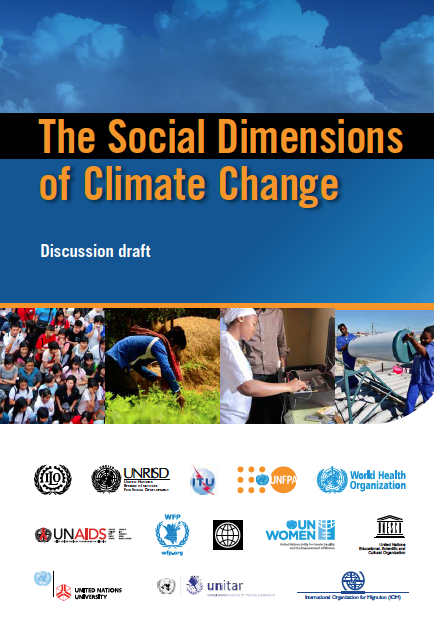This discussion paper, produced by 20 UN Agencies, addresses the social dimensions of climate change from the perspective sustainable equitable development.
It calls on decision makers to incorporate social impact assessments, and ensure transparent and participatory decision-making processes in order to achieve multiple benefits and avoid exacerbating inequities, wasting resources, and undermining climate change objectives.
 7 December 2011: The UN High-Level Committee on Programmes Working Group on Climate Change has released a draft report highlighting the social dimensions within the climate change international negotiations and country implementation.
7 December 2011: The UN High-Level Committee on Programmes Working Group on Climate Change has released a draft report highlighting the social dimensions within the climate change international negotiations and country implementation.
Produced with input of 20 UN Agencies, the draft report addresses the social dimensions of climate change within a framework of sustainable, equitable development and in view of the overarching goal of promoting human welfare and equal access to life-sustaining resources.
The paper addresses social dimensions, understood as social, economic and behavioral aspects as critical components of climate policies, in four substantive sections: the rationale for integrating social dimensions into climate change policy; social drivers; social dimensions of vulnerability and impacts and implications for adaptation; and the way forward towards integrating social dimensions of climate change in climate change policy responses.
The draft paper concludes that a social dimensions lens broadens the understanding of climate vulnerability and directs attention to its socioeconomic conditions, such as human and social resources, institutions, policies and power relations. Furthermore, it calls for these determinants to be addressed to achieve pro-poor adaptation and enhancing resilience among the most vulnerable communities. The social dimensions lens also directs attention to impacts on human human health and well-being, social institutions and demographic factors as critical elements of people’s resilience.
The draft paper urges government leaders to: assess the drivers of climate change in national assessments; consistently incorporate social impact assessments; and ensure transparent and participatory decision-making processes, noting that people-centred and multi-sectoral climate policies will yield multiple co-benefits, while their absence risks exacerbating inequities, wasting resources, and undermining climate change objectives.
This paper was prepared under the auspices of the UN Task Team on Social Dimensions of Climate Change, which is currently composed of: UN Food and Agriculture Organization (FAO), International Labour Organization (ILO), International Organization for Migration (IOM), International Telecommunication Union (ITU), Office of the High Commissioner for Human Rights (OHCHR), Joint UN Programme on HIV/AIDS (UNAIDS), UN Department of Economic and Social Affairs (UNDESA), UN Development Programme (UNDP), UN Educational, Scientific and Cultural Organization (UNESCO), UN Population Fund (UNFPA), UN Human Settlements Programme (UN-HABITAT), UN Children’s Fund (UNICEF), UN Institute for Training and Research (UNITAR), UN International Strategy for Disaster Reduction (UN/ISDR), UN Research Institute for Social Development (UNRISD), UN University (UNU), UN Women, World Bank (WB), World Food Programme (WFP) and the World Health Organization (WHO). [Publication: The Social Dimensions of Climate Change (draft for discussion)]